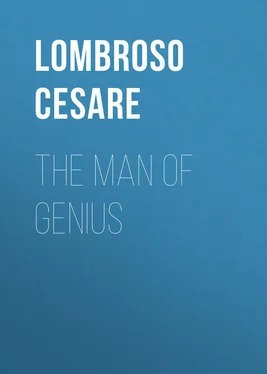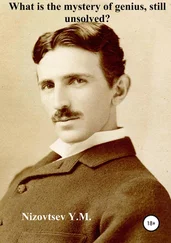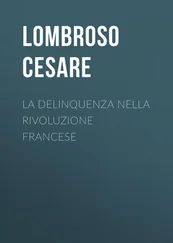Cesare Lombroso - The Man of Genius
Здесь есть возможность читать онлайн «Cesare Lombroso - The Man of Genius» — ознакомительный отрывок электронной книги совершенно бесплатно, а после прочтения отрывка купить полную версию. В некоторых случаях можно слушать аудио, скачать через торрент в формате fb2 и присутствует краткое содержание. Жанр: foreign_antique, foreign_prose, на английском языке. Описание произведения, (предисловие) а так же отзывы посетителей доступны на портале библиотеки ЛибКат.
- Название:The Man of Genius
- Автор:
- Жанр:
- Год:неизвестен
- ISBN:нет данных
- Рейтинг книги:5 / 5. Голосов: 1
-
Избранное:Добавить в избранное
- Отзывы:
-
Ваша оценка:
- 100
- 1
- 2
- 3
- 4
- 5
The Man of Genius: краткое содержание, описание и аннотация
Предлагаем к чтению аннотацию, описание, краткое содержание или предисловие (зависит от того, что написал сам автор книги «The Man of Genius»). Если вы не нашли необходимую информацию о книге — напишите в комментариях, мы постараемся отыскать её.
The Man of Genius — читать онлайн ознакомительный отрывок
Ниже представлен текст книги, разбитый по страницам. Система сохранения места последней прочитанной страницы, позволяет с удобством читать онлайн бесплатно книгу «The Man of Genius», без необходимости каждый раз заново искать на чём Вы остановились. Поставьте закладку, и сможете в любой момент перейти на страницу, на которой закончили чтение.
Интервал:
Закладка:
When Johnson walked along the streets of London he was compelled to touch every post he passed; if he omitted one he had to return. He always went in or out of a door or passage in such a way that either his right or his left foot (Boswell was not certain which) should be the first to cross the threshold; when he made any mistake in the movement, he would return, and, having satisfactorily performed the feat, rejoin his companions with the air of a man who had got something off his mind. Napoleon I. could not pass through a street, even at the head of his army, without counting and adding up the rows of windows. Manzoni, in a letter (addressed to Giorgio Briano) which has become famous, declared that he was incapable of giving himself up to politics because he did not know how to decide on anything; he was always in a state of uncertainty before every resolution, even the most trifling. He was afraid of drowning in the smallest puddle, and could never resolve to go out alone; he confessed on various occasions that, from his youth up, he had suffered from melancholy. 115 115 Letters , p. 62.
He passed whole days without being able to apply himself to anything, 116 116 Ibid. , pp. 62, 119, 123.
so that in a month there were five or six useful days during which he worked five hours, and then he became incapable of thinking. 117 117 G. Sforza, Epistolario di A. Manzoni , Milan, 1883.
Ugo Foscolo said that “very active in regard to some things, he was in regard to others less than a man, less than a woman, less than a child.” 118 118 Epistolario , 3, p. 163.
Tolstoi confesses that philosophic scepticism had led him into a condition approximating to madness; let us add, to folie du doute . “I imagined,” he said, “that there existed nothing outside me, either living or dead; that the objects were not objects, but vain appearances; this state reached such a point that sometimes I turned suddenly round, and looked behind me in the hope of seeing nothing where I was not.” “The deplorable mania of doubt exhausts me,” cried Flaubert, “I doubt about everything, even about my doubts.” 119 119 Correspondance , p. 119. 1887.
“I am embarrassed and frightened at my own ideas,” wrote Maine de Biran, “every expression stops me and gives me scruples. I have no confidence in anything that I publish, and am always tempted to withdraw my works when they have scarcely appeared, to substitute others which would certainly be worthless. I always call those happy who are tied down to fixed labour, who are not submitted to the torment of uncertainty, to the indecision which poisons men who are masters of their time. I am always trying my strength; I commence, and recommence again and again. It is my fortune to be useless, to be wanting in measure, never to feel my existence, never to have confidence in my capacity. I am never happy wherever I am, because I carry within my own organism a source of affliction and unrest. I have only sufficient feeling of my own personality to feel my impotence, which is a great torture. I am always ready to do a number of things … and I do nothing.” 120 120 Journal de ma vie intime.
The little miseries of existence were tortures for Carlyle; to have to pack his portmanteau was a grave affair of state; the idea of ordering coats or buying gloves crushed him. “I have long renounced the omnibus,” wrote Renan in his Souvenirs de Jeunesse , “the conductors refuse to regard me as a serious traveller. At the railway station, unless I have the protection of an inspector, I always obtain the worst place… I see too well that to do a good turn to one, is usually to do a bad one to another. The vision of the unknown person I am injuring stops short my zeal.”
Renan, indeed, is a most singular instance of these characteristics in connection with genius, from his earliest years. At mass his childish eye wandered over the roof of the chapel, and he thought of the great men told of in books. It was his dream to write books. “My gentleness,” he writes, “which often arises from indifference, my indulgence, which is very sincere and which depends on a clear perception of the injustice of men to each other, the conscientious habits which are a pleasure to me, the indefinite endurance of ennui which I possess – having, perhaps, been inoculated in my youth – may be explained by my surroundings, and the deep impressions I have received. The paradoxical vow to preserve the clerical virtues without the faith which serves as basis for them, and in a world for which they are not made, produced, so far as I am concerned, the most amusing incidents. If ever a comic writer wishes to amuse the public at my expense, he needs but my collaboration; I could tell him things far more amusing than he could invent.” A layman and a sceptic he preserved, involuntarily, the vow of poverty. “My dream would be to be housed, fed, clothed, and warmed, without having to think about it, by someone who would take charge of me and leave me free. The competence which I possess came late, and in spite of myself… I always thought about writing; it did not occur to me it could bring me any money. What was my astonishment when I saw a gentleman of agreeable and intelligent appearance enter my garret, compliment me on some articles I had published, and offer to collect them in a volume. He brought a stamped paper stipulating conditions I thought astonishingly generous, so that when he asked me to include all my future writings in the same contract, I consented. The idea came to me to make some observations, but I paused at sight of the document; the thought that that beautiful sheet of paper would be lost stopped me. I did well to stop.” The politeness which he wrongly believes he learnt at the seminary is not the raw and cold politeness of the priest, but the special and excessive timidity of genius. He could not, he says, treat even a dog with an air of authority. But authority is the chief characteristic of priests. To imagine as he does that men are always good and deserving could only be, as he himself justly notes, a continual danger. “Notwithstanding all my efforts to the contrary, I was predestined to be what I am, a romantic protesting against romanticism, an utopian preaching materialistic politics, an idealist uselessly giving himself much trouble to appear bourgeois , a tissue of contradictions… It is as a great observer Challemel-Lacour has excellently said, ‘He thinks like a man, feels like a woman, and acts like a child.’ I do not complain, since this moral constitution has procured me the most vivid intellectual joys that may be tasted.” 121 121 Souvenirs d’Enfance et de Jeunesse.
But the most striking example of this permanent state of doubt is supplied by another philosopher, the author of a journal of his own life, Amiel. He was so tormented by doubt that the strength of his genius was only shown after his death, when in his journal he revealed with absolute exactness the wound which gnawed him. Let us read a few of the most remarkable passages: —
“As life flees,” he says, “I mourn the loss of reality: thought is sad without action, and action is sad without thought: the real is spoilt when the ideal has not added its perfume; but the ideal, when not made one with the real, becomes a poison. I have never learnt the art of writing; it would have been useful to me, but I was ashamed of the useful: on the other hand, I have acquired two opposed intellectual habits: to note immediately passing impressions and to analyse them scientifically… This journal will be useful to no one, and even for me it will serve rather to plan out life than to practice it; it is a pillow of idleness… And even in style I am unequal. Always energetic and correct: that results from my existence: I see before me several expressions and I do not know which I ought to choose. The unique expression is an act of courage which implies confidence in oneself… I discovered very early that it is easier to give up a wish than to gratify it… The idea may be modified, but not the action, so I abhor it, for I fear useless remorse: I thrust aside the idea of a family, because every lost joy is the stab of a knife, because every hope is an egg from which may proceed a serpent as well as a dove… Action is my cross because it would be my dream; but to be false to the ideal would soil the conscience and be an unpardonable error… It is my passion to injure my interests. When a thing attracts me I flee from it.” 122 122 Amiel, Journal Intime , Geneva, 2nd ed., 1889.
Интервал:
Закладка:
Похожие книги на «The Man of Genius»
Представляем Вашему вниманию похожие книги на «The Man of Genius» списком для выбора. Мы отобрали схожую по названию и смыслу литературу в надежде предоставить читателям больше вариантов отыскать новые, интересные, ещё непрочитанные произведения.
Обсуждение, отзывы о книге «The Man of Genius» и просто собственные мнения читателей. Оставьте ваши комментарии, напишите, что Вы думаете о произведении, его смысле или главных героях. Укажите что конкретно понравилось, а что нет, и почему Вы так считаете.












